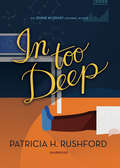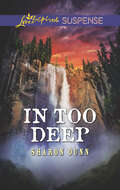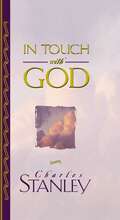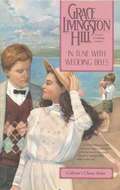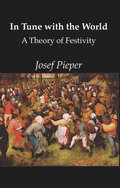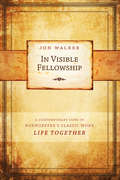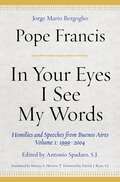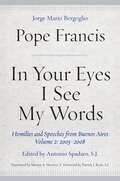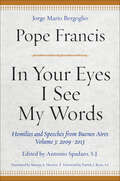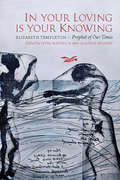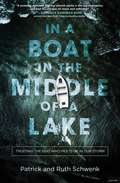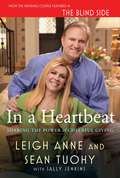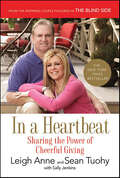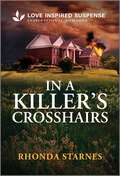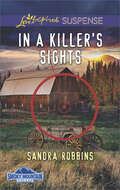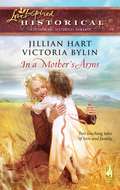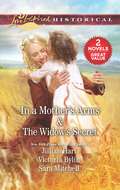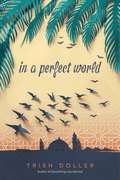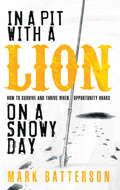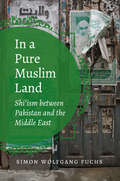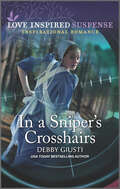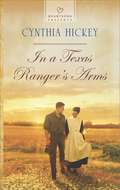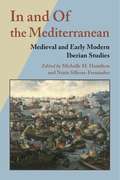- Table View
- List View
In Too Deep
by Patricia H. Rushford Rachel DuludeJennie McGrady’s summer has just settled back into a comfortable lull when her chemistry teacher, Tom Mancini, turns up dead from a drug overdose in his lab at Trinity High School. A suicide note seems to close the case, but Jennie smells foul play—especially since a series of break-ins had been reported at the school—and her sleuthing uncovers some unsettling information. The hard part comes when she must convince police to investigate without implicating herself in the crime.
In Too Deep (Tearoom Mysteries #22)
by Elizabeth AdamsJan agrees to chaperone the church youth group, including her granddaughter Avery, on a late-fall overnight camping trip. But she is horrified when she wakes the next morning to discover Avery has wandered off into the Maine wilderness, accompanied only by a new friend. As temperatures drop and flurries fall, Jan's desperation increases as she and the other youth-group leaders are joined by law enforcement officers in a frantic search. Can they find the missing girls and bring them to safety before it's too late? Meanwhile, Elaine has been planning an engagement party for her daughter, Sasha, and Sasha's fiancé, Brody. But, despite Jan's insistence that they carry on, how can they bring themselves to celebrate when Avery's missing? Mix together one stately Victorian home, a charming lakeside town in Maine, and two adventurous cousins with a passion for tea and hospitality. Add a large scoop of intriguing mystery and sprinkle generously with faith, family, and friends, and you have the recipe for Tearoom Mysteries.
In Too Deep: Undercover Memories In Too Deep Framed For Christmas (Mills And Boon Love Inspired Suspense Ser.)
by Sharon DunnA DEA agent goes undercover as a witness’s boyfriend to protect her life and eliminate a drug cartel in this inspirational romantic suspense novel.After one of the at-risk teens she mentors calls her for help, Sierra Monforton witnesses a drug deal—and suddenly she’s in a killer’s crosshairs. To protect her, undercover DEA agent Joseph Anderson must keep Sierra close—as her pretend boyfriend. Joseph’s assignment may be to take down a drug ring, but he’ll risk everything to ensure Sierra doesn’t get hurt.
In Touch With God: Develop A Closer Relationship With God (In Touch Study Ser. #Vol. 19)
by Charles F. StanleyPastor and bestselling author Charles Stanley brings you closer to the Lord in this unique book filled with inspirational Scriptures as well as thoughts and prayers from the author. "In Touch With God" will help you know God's heart on a variety of topics, including forgiveness, His guidance, relationships, Spirit-filled living, Christian character, adversity, and God's plan for your life.
In Tune With Wedding Bells (Living Books Romance #13)
by Grace Livingston Hill[from the back cover] "Reuben Remington's life is all settled. As an ambitious young executive who is on the rise in his company, one thing he definitely doesn't have time for is distractions! Then Reuben encounters a frightened young woman who is on the run with her precocious five-year-old brother. Before he knows it, he is caught in the biggest distraction of his life! And, as he is drawn more and more deeply into Gillian and Noel's lives, he finds himself fighting to protect them from the threatening shadows of their past. But will he be able to do what it will take to save the two people who have so effectively brought upheaval into his well-ordered life?"
In Tune with the World: A Theory of Festivity
by Pieper Josef Richard Winston Claran this stimulating and still-timely study, Josef Pieper takes up a theme of paramount importance to his thinking – that festivals belong by rights among the great topics of philosophical discussion. As he develops his theory of festivity, the modern age comes under close and painful scrutiny. It is obvious that we no longer know what festivity is, namely, the celebration of existence under various symbols <P><P> Pieper exposes the pseudo-festivals, in their harmless and their sinister forms: traditional feasts contaminated by commercialism; artificial holidays created in the interest of merchandisers; holidays by coercion, decreed by dictators the world over; festivals as military demonstrations; holidays empty of significance. And lastly we are given the apocalyptic vision of a nihilistic world which would seek its release not in festivities but in destruction.
In Visible Fellowship: A Contemporary View on Bonhoeffer's Classic Work Life Together
by Jon WalkerJon Walker engages Bonhoeffer's classic work on Christian life in community, presenting its rich and vital themes for Christians in the twenty-first century. Christians were never meant to live life alone. Only "in visible fellowship" do we learn to love one another and to live like Jesus is real.Can you go it alone in this world and live out the Christian mission and life? Can you possibly live out the full life Christ promised with all of its power and wonder without the love of the family of God?In his first book on Bonhoeffer's writings, "Costly Grace," Jon Walker gave a contemporary view of "The Cost of Discipleship." In this second book, focusing on Bonheoffer's follow-up book, "Life Together," Walker searches deeply into Bonheoffer's classic work to bring us a contemporary view of life in the body of Christ.In our individualistic culture, Christians learn how to live in communities of love. God is relentless in his command to "love each other in the same way that I have loved you"-personal and up-close, meeting the needs of the undeserving, not attacking their faults.Walker brings a clear voice and powerful teaching to Bonheoffer's classic work on the church enabling you to understand the great importance of the Body of Christ. Through life together we grow into authentic spiritual maturity. As we live out the life of faith together, the love, forgiveness, and power of Christ literally and visibly comes alive for the world.
In Your Dreams (Sierra Jensen #2)
by Robin Jones GunnFrom the bestselling author of The Christy Miller Series, this series centers around Christy Miller's friend Sierra Jensen. Sierra is a spunky and bold sixteen-year-old with big dreams and unconventional clothes. Today's teens can truly relate to what is going on in Sierra's life -- whether it's friendships, dating, or learning to trust in God. Sierra shows readers how to have a relationship with Jesus Christ and how to grow in their commitment to Him.
In Your Eyes I See My Words: Homilies and Speeches from Buenos Aires, Volume 1: 1999–2004
by Pope FrancisAn extraordinary opportunity to understand the vision of Pope FrancisPope Francis is a first in many ways: the first pope from the Americas, the first Jesuit, the first Francis, the first child of immigrants from the Old World, nurtured and transformed by the New World, and returned to lead the whole world. His eloquent homilies and speeches have inspired the faithful of Argentina for decades, largely through his gift of oratory, tracing back to his time as a bishop, archbishop, and cardinal in his home country. Published in English for the first time in their entirety and with contextual annotations, In Your Eyes I See My Words, Volume 1 collects his homilies and speeches from 1999 to 2004. Volume 2 spans from 2005 to 2008, and Volume 3, from 2009 to 2013, concludes with his prophetic last homily before his election to the papacy.This illuminating collection presents an extraordinary opportunity to understand the vision of a great pastor. His words bear witness to the deep experience of faith among God’s people while also showcasing his own extraordinary ability to connect with communities of faith. Through these homilies and speeches, Pope Francis humbly displays his abilities as a wordsmith, a patient and attentive teacher, an inspired and faithful theologian, and a sensitive pastor uniquely attuned to his people, offering ready guidance for their journeys, but also journeying with them.The first of a three-volume translation of Pope Francis’s theological, pastoral, anthropological, and educational thought provides rich insights into the mind and theological unfolding of a spiritual leader who has become beloved all across the globe. Within it we see Archbishop Jorge Mario Bergoglio—later Pope Francis—ministering to the needs of the people while also engaging with the political, technological, and societal forces affecting their daily lives. Here is an ecclesial voice not afraid to challenge the politicians, the culture-makers, and media moguls—even his own ordained and lay church ministers—to live a life of faithfulness marked by justice, equality, and concern for the needs of everyone, urging all to rely on the “vitality of memory” and the “recovery of hope.” In Your Eyes I See My Words also provides a glimpse into the political, social, and religious environment of Argentina and Latin America, providing a unique perspective on the issues confronting the faithful and how those issues motivated and nurtured Pope Francis’s understanding of the Church’s mission to all segments of society—particularly to those underrepresented and on the margins of history.
In Your Eyes I See My Words: Homilies and Speeches from Buenos Aires, Volume 2: 2005–2008
by Pope FrancisIn Your Eyes I See My Words, Volume 2 contains Pope Francis’s homilies and speeches spanning from 2005 to 2008. Continuing what began in the first volume of this three-volume publication, Volume 2 shows Archbishop Bergoglio’s growth as a pastor and a theologian/scholar in the midst of his people. At the same time, it shows him emerging as an international voice calling for changes in the way the Church carries out its ministry and its educational task on behalf of children, youth, adults, and church ministers. In his homilies from Christmas, Easter, and especially in his response to the tragic fire and deaths of 194 people at the nightclub Republica Cromañon, we see Bergoglio speak passionately to his parishioners, challenging them with equal portions of tenderness and righteous anger. Perhaps uniquely, we also watch as his audiences, prominence, and influence grow globally, foreshadowing who he will become in 2013 when he is elected Pope.On the larger national and international scale, Bergoglio addresses various conferences, such as the Argentina Press Association and the Episcopal Conference of Argentina of which he was elected President in 2005 and served the maximum possible term of six years. We see and read as his work takes him outside his country to Rome (2007) at the Pontifical Commission for Latin America; to Brasil (2007), where his presentation on the Crisis of Civilization and Culture at the Fifth CELAM Conference ends up shaping much of the Aparecida Conclusions; and finally, to Quebec (2008) as he speaks at the Forty-Ninth International Eucharistic Congress.All told, In Your Eyes I See My Words, Volume 2 is a glimpse into a period of time in which Archbishop Bergoglio grows immensely in thought, reflection, and action, laying the groundwork for the mature, thoughtful, and beloved Pope Francis he has come to be known as around the world.
In Your Eyes I See My Words: Homilies and Speeches from Buenos Aires, Volume 3: 2009–2013
by Pope FrancisThe homilies and speeches of Archbishop Cardinal Jorge Mario Bergoglio from 2009 through his election as Pope Francis in 2013. These writings provide an intimate glimpse into the theological, philosophical, scientific, and cultural-educational currents that forged the steady, loving, and nurturing leadership style with which Jorge Mario Bergoglio guided the Church in Buenos Aires, Argentina. That style has now done the same for the Church from Rome, a Church rocked by financial and moral scandals, and a world shaken by the worst global pandemic in a century. These writings were kneaded—a word he uses when talking about the work of molding the souls and character of youth and seminarians—in the relationships he formed in his bus rides to work and in his intense contact with all segments of the population. Because of that careful and prayerful process of kneading, they have found their full development in Bergoglio&’s writing as Pope Francis, especially in Evangelii gaudium (November 2013); Gaudete et exsultate, On the call to sanctity (March 2018); and his encyclical Laudato si&’ (May 2015). In this final volume of Bergoglio&’s homilies and papers we meet European theologians and thinkers such as Hans Urs von Balthasar; Henri de Lubac; Bergoglio&’s friend, the Uruguayan philosopher Methol Ferré, the literary figure Miguel Ángel Asturias, and Enrique Santos Discépolo, a singer and composer of tangos that decry corruption. In a prophetic conclusion, the last homily of this volume is an outline of the roadmap Pope Francis has followed throughout his papacy: one defined by ongoing love and care for God&’s people that seeks to spread God&’s merciful anointing to those living on the margins of life.
In Your Loving is Your Knowing: Elizabeth Templeton—Prophet of Our Times
by Peter Matheson and Alastair Hulbert&“A wonderful book . . . [Templeton&’s] style and material are a very appealing combination of the cerebral and the down-to-earth, full of humor and a seasoning of personal anecdotes.&” —Coracle An anthology of 33 talks, articles, lectures and sermons by one of the most outstanding theologians of her generation. Elizabeth Templeton&’s accessible and passionate writing is both refreshing and thought-provoking, exploring ideas that concern us all—life, freedom, forgiveness, death, love, evil, culture and belonging, among many others. All the pieces dive with apparent effortlessness to the heart of the issues, combining brilliant original scholarship with a warm sensitivity to the difficulties of many people in decoding theology, relating it to their own life and thought.&“[Templeton] was known and appreciated for her freedom of speech and attentiveness to anyone and everything . . . Her interest in the Church&’s relationship with the world is what comes out in theses texts.&” —Conference of European Churches&“This collection of [Templeton&’s] unpublished addresses and writings testifies [that] she brought as much theological acuteness and passion to sermons in local churches as she did to the World Council of Churches Assembly, or the Lambeth Conference . . . Matheson and Hulbert have negotiated their [editorial assignment] sensitively and coherently . . . Readers will find many more valuable nuggets for themselves.&” —The Church Times
In a Boat in the Middle of a Lake: Trusting the God Who Meets Us in Our Storm
by Patrick and SchwenkYour Storm Doesn&’t Have to Sink YouAt some point in our lives, we all find ourselves in a boat in the middle of a lake. We might be there due to a job loss or the death of a loved one. Maybe disability, divorce, or financial insecurity has stranded us. Patrick and Ruth Schwenk found themselves feeling battered after five miscarriages and then surrounded by the waves with Patrick&’s cancer diagnosis at age forty-three. They were alone. Drifting. And that&’s when their transformation began.In this compassionate and powerful book, the Schwenks weave together lessons from their own experience with insightful Bible teaching to remind us that one of the greatest ways God transforms us is through trials. As they unpack why Jesus called the disciples into the middle of a lake when dry ground was so safe and comfortable, they help us understand why the depth of our hurt enables us to experience deep hope;learn to conquer fear to experience the freedom God has for us; anddiscover how God uses chaos, and not just the classroom, to shape and work through us.Today—in your confusion about God&’s intentions, your disappointment over lost dreams, your disillusionment about prayer—God is offering hope. Because Jesus is still Lord over the water. And while he is not moved by the waves, he is moved by you. And this flood might just be a path to abundance. &“A powerful reminder that our current reality is not our final reality, and God is Lord over all chaos and suffering!&”—Candace Cameron Bure, actress and New York Times bestselling author
In a Heartbeat: Sharing the Power of Cheerful Giving
by Sally Jenkins Leigh Anne Tuohy Sean TuohyFor the first time, the remarkable couple depicted in The Blind Side tells their own deeply inspiring story--First came the bestselling book, then the Oscar-nominated movie--the story of Michael Oher and the family who adopted him has become one of the most talked-about true stories of our time. But until now, Leigh Anne and Sean Tuohy have never told this astonishing tale in their own way and with their own words. For Leigh Anne and Sean, it all begins with family. Leigh Anne, the daughter of a tough-as-nails U. S. Marshal, decided early on that her mission was to raise children who would become "cheerful givers. " Sean, who grew up poor, believed that one day he could provide a home that would be "a place of miracles. " Together, they raised two remarkable children--Collins and Sean Jr. -- who shared their deep Christian faith and their commitment to making a difference. And then one day Leigh Anne met a homeless African-American boy named Michael and decided that her family could be his. She and her husband taught Michael what this book teaches all of us: Everyone has a blind side, but a loving heart always sees a path toward true charity. Michael Oher's improbable transformation could never have happened if Leigh Anne and Sean Tuohy had not opened their hearts to him. In this compelling, funny, and profoundly inspiring book, the Tuohys take us on an extraordinary journey of faith and love--and teach us unforgettable lessons about the power of giving.
In a Heartbeat: Sharing the Power of Cheerful Giving
by Sally Jenkins Leigh Anne Tuohy Sean TuohyFor the first time, the remarkable couple depicted in The Blind Side tells their own deeply inspiring storyFirst came the bestselling book, then the Oscar-nominated movie—the story of Michael Oher and the family who adopted him has become one of the most talked-about true stories of our time. But until now, Leigh Anne and Sean Tuohy have never told this astonishing tale in their own way and with their own words. For Leigh Anne and Sean, it all begins with family. Leigh Anne, the daughter of a tough-as-nails U.S. Marshal, decided early on that her mission was to raise children who would become "cheerful givers." Sean, who grew up poor, believed that one day he could provide a home that would be "a place of miracles." Together, they raised two remarkable children—Collins and Sean Jr.—who shared their deep Christian faith and their commitment to making a difference. And then one day Leigh Anne met a homeless African-American boy named Michael and decided that her family could be his. She and her husband taught Michael what this book teaches all of us: Everyone has a blind side, but a loving heart always sees a path toward true charity. Michael Oher's improbable transformation could never have happened if Leigh Anne and Sean Tuohy had not opened their hearts to him. In this compelling, funny, and profoundly inspiring book, In a Heartbeat, the Tuohys take us on an extraordinary journey of faith and love—and teach us unforgettable lessons about the power of giving.
In a Killer's Crosshairs
by Rhonda StarnesA murderer is on the loose… and nowhere is safe. Psychologist Brooklyn Thomas narrowly survives a fire in her home and realizes that the notorious serial killer the Chastiser is back. He targeted her fifteen years ago and she managed to escape his clutches—and now he wants to exact his deadly revenge. When his attacks become more frequent, former FBI agent Landon Wentworth is the only person Brooklyn trusts to protect her—and their only option is to run. But the clock is ticking in their race to evade the killer's wrath before Brooklyn becomes his final victim…From Love Inspired Suspense: Courage. Danger. Faith.
In a Killer's Sights (Smoky Mountain Secrets #1)
by Sandra RobbinsIn this inspirational romantic suspense, a former lawman takes his ex-wife under his protection and learns he is the father of her child.When Gwen Harwell witnesses someone dumping a body into a Tennessee river, she knows she’s the killer’s new target. Far from home on a work assignment, she isn’t sure where to turn—especially when her ex-husband shows up. Five years ago, Dean Harwell’s burdens from his police work tore their marriage apart. But now he says he’s changed. He’s working as a rancher; he’s put his problems behind him. And he’s committed to keeping her safe until the killer is caught. With their troubled past, trusting him with her life is hard enough. Can she trust him with the truth about the child he doesn’t know they have?
In a Mother's Arms
by Jillian Hart Victoria BylinFinally a Family by Jillian HartWidow Molly McKaslin won't marry for less than true love. But does handsome town doctor Sam Frost want a wife, or a housekeeper for his daughters? With the help of two little matchmakers, Molly might end up with the family of her dreams.Home Again by Victoria BylinWhen her troublemaking son vandalizes the town church, Cassie O'Rourke comes face-to-face with town sheriff--and former love--Gabe Wyatt. The honorable lawman offers to help tame her wild child, if he can come courting. For the love of her son, dare she entrust her heart to this man once more?
In a Mother's Arms & The Widow's Secret: A 2-in-1 Collection
by Jillian Hart Victoria Bylin Sara MitchellThree touching tales of love, family and faithIn a Mother’s Arms by Jillian Hart and Victoria BylinIn “Finally a Family” by Jillian Hart, widow Molly McKaslin won’t marry for less than true love. But does handsome town doctor Sam Frost want a wife or a housekeeper for his daughters? With the help of two little matchmakers, Molly might end up with the family of her dreams. In “Home Again” by Victoria Bylin, Cassie O’Rourke comes face-to-face with town sheriff—and her former love—Gabe Wyatt when her troublemaking son vandalizes the local church. The honorable lawman offers to help tame her wild child, if he can come courting. For the love of her son, dare she entrust her heart to this man once The Widow’s Secret by Sara MitchellSecret Service agent Micah MacKenzie needs Jocelyn Tremayne’s help to uncover a conspiracy in New York City’s privileged circles. But the more she risks to help him, the more he sees the wrongly judged woman she truly is. Now he’s determined to win her trust, rekindle her belief—and prove his love.
In a Perfect World (Fountas & Pinnell LLI Blue)
by Trish DollerFrom critically acclaimed author Trish Doller comes a gorgeous, hopeful, and heartbreaking novel, set in Cairo, Egypt, about the barriers we tear down for the people and places we love most.Caroline Kelly is excited to be spending her summer vacation working at the local amusement park with her best friend, exploring weird Ohio with her boyfriend, and attending soccer camp with the hope she’ll be her team’s captain in the fall. But when Caroline’s mother is hired to open an eye clinic in Cairo, Egypt, Caroline’s plans are upended. Caroline is now expected to spend her summer and her senior year in a foreign country, away from her friends, her home, and everything she’s ever known. With this move, Caroline predicts she’ll spend her time navigating crowded streets, eating unfamiliar food, and having terrible bouts of homesickness. But when she finds instead is a culture that surprises her, a city that astounds her, and a charming, unpredictable boy who challenges everything she thought she knew about life, love, and privilege.
In a Pit with a Lion on a Snowy Day: How to Survive and Thrive When Opportunity Roars
by Mark BattersonYour greatest regret at the end of your life will be the lions you didn't chase. You will look back longingly on risks not taken, opportunities not seized, and dreams not pursued. Stop running away from what scares you most and start chasing the God-ordained opportunities that cross your path. In a Pit with a Lion on a Snowy Day is inspired by one of the most obscure yet courageous acts recorded in Scripture, a blessed and audacious act that left no regrets: "Benaiah chased a lion down into a pit. Then, despite the snow and slippery ground, he caught the lion and killed it" (2 Samuel 23:20 -21). Unleash the lion chaser within! What if the life you really want, and the future God wants for you, is hiding right now in your biggest problem, your worst failure...your greatest fear? Story Behind the Book"Our best days often start out as our worst days. And our greatest opportunities are often disguised as our biggest problems. You can land in a pit with a lion on a snowy day, and it will seem like the end of the road. But God is in the recycling business. He recycles past experiences and uses them to prepare us for future opportunities. That is the story of my life. And that is the story of your life. Look in the rearview mirror long enough and you'll see that God has purposely positioned you everywhere you've been--even when it seemed you'd taken a wrong turn." --Mark Batterson
In a Pure Muslim Land: Shi'ism between Pakistan and the Middle East (Islamic Civilization and Muslim Networks)
by Simon Wolfgang FuchsCentering Pakistan in a story of transnational Islam stretching from South Asia to the Middle East, Simon Wolfgang Fuchs offers the first in-depth ethnographic history of the intellectual production of Shi'is and their religious competitors in this "Land of the Pure." The notion of Pakistan as the pinnacle of modern global Muslim aspiration forms a crucial component of this story. It has empowered Shi'is, who form about twenty percent of the country's population, to advance alternative conceptions of their religious hierarchy while claiming the support of towering grand ayatollahs in Iran and Iraq. Fuchs shows how popular Pakistani preachers and scholars have boldly tapped into the esoteric potential of Shi'ism, occupying a creative and at times disruptive role as brokers, translators, and self-confident pioneers of contemporary Islamic thought. They have indigenized the Iranian Revolution and formulated their own ideas for fulfilling the original promise of Pakistan. Challenging typical views of Pakistan as a mere Shi'i backwater, Fuchs argues that its complex religious landscape represents how a local, South Asian Islam may open up space for new intellectual contributions to global Islam. Yet religious ideology has also turned Pakistan into a deadly battlefield: sectarian groups since the 1980s have been bent on excluding Shi'is as harmful to their own vision of an exemplary Islamic state.
In a Sniper's Crosshairs
by Debby GiustiFrom USA TODAY bestselling author Debby Giusti An assassin&’s loose in Amish country… and she&’s not the only target. When a radio broadcast describes taxi driver Lily Hudson&’s passenger as an armed criminal, she becomes his immediate target. Narrowly escaping, Lily accepts Matthias Overholt&’s offer to hide at his Amish family farm for Christmas—until evidence reveals the gunman&’s plan is tied to Lily&’s past. Now to prevent an assassination, Lily and Matthias must unravel a years-old conspiracy…and evade a sniper who has them in his sights.From Love Inspired Suspense: Courage. Danger. Faith.
In a Texas Ranger's Arms
by Cynthia HickeyKATIE GAMBLE IS ON THE RUN After her unscrupulous stepfather accuses her of being a thief, a horrified Katie hopes to hide out until she can prove otherwise. But slipping into obscurity in a small Texas town isn't so easy. Not with Texas Ranger Ward Alston on her tail. Ward's used to getting his man-or woman. But he's not used to the accused being so resolute in her innocence or so beautifully appealing. As he uncovers the truth, Ward realizes this Harvey Girl isn't all she seems. Together, can they evade danger and obey the law of their own hearts?
In and Of the Mediterranean: Medieval and Early Modern Iberian Studies (Hispanic Issues)
by Michelle M. Hamilton Nuria Silleras-FernandezThe Iberian Peninsula has always been an integral part of the Mediterranean world, from the age of Tartessos and the Phoenicians to our own era and the Union for the Mediterranean. The cutting-edge essays in this volume examine what it means for medieval and early modern Iberia and its people to be considered as part of the Mediterranean.
